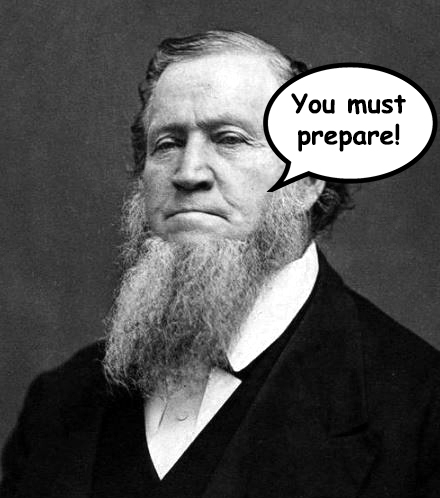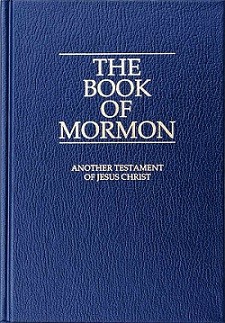
Long-time preppers know that the Latter-day Saints were prepping well before “prepping” was a household term. Storing supplies and being ready for unexpected events has been a central philosophy to church teachings. While this is well-known, not everyone knows exactly why.
Mormon Preppers
The Church of Jesus Christ of Latter-day Saints (AKA LDS Church or Mormon Church) was initially based on the prophesies and writings of Joseph Smith, who penned the Book of Mormon. Within the broad classification of the LDS religion, several branches differ, sometimes substantially, on some of the central religious beliefs.
Related article: Download the Latter-day Saints LDS Preparedness Manual
Most factions of the Mormon church emphasize self-reliance as a way of life, whether in preparation for a second Messianic coming or natural and man-made SHTF situations. Sometimes the two are overlapping. After all, preparations for Armageddon are useful in the event of economic collapse or pandemic. In fact, the Church of Jesus Christ has its own online store where you can buy ceremonial clothing as well as prepper supplies, so you can prepare for the rapture and amass your long-term food stockpiles in the same order.
Latter-day Saints, Scripture, and Prepping

Most members back up their preparations from certain scriptures in the holy text Doctrine and Covenants, which is part of the church’s religious canon.
I tell you these things because of your prayers; wherefore, treasure up wisdom in your bosoms, lest the wickedness of men reveal these things unto you by their wickedness, in a manner which shall speak in your ears with a voice louder than that which shall shake the earth; but if ye are prepared ye shall not fear.
Doctrine and Covenants 38:30
Organize yourselves; prepare every needful thing, and establish a house, even a house of prayer, a house of fasting, a house of faith, a house of learning, a house of glory, a house of order, a house of God.
Doctrine and Covenants 109:8
In 2007, the Latter-day Saints distributed the pamphlet All Is Safely Gathered In: Family Home Storage to guide families in the stockpiling of food, water, and getting their finances in order. The church encourages families to have three months to a year’s supply of food and water and to be debt-free, so as not to be a burden on the church or other members during times of crisis.
But if any provide not for his own, and specially for those of his own house, he hath denied the faith, and is worse than an infidel.
1 Timothy 5:8 King James’ Version
The general idea is for families to be prepared but not to go to extremes. In fact, members that have taken these precautionary words a little too much to heart have not only been reprimanded but “survivalists” have been excommunicated as well.
Extremist Mormon Prepping
That hasn’t stopped Mormon preppers from doing their thing, though. Some extremists continue to stockpile food, water, and weapons for the “End of Days.” Even though scripturally, God will do the accounting by destroying the wicked and resurrecting the righteous (John 5:29); apparently, it doesn’t hurt to be armed to the teeth in case God calls on you to lend a hand (Revelation 20:6).
One site, run by LDS Avow, also focuses on prophecies and preparation. Part of the doctrine of this group of Latter-day Saints is that SHTF scenarios are pre-cursers to the Second Coming. So if you want to make it through to the second resurrection, then you’d better still be alive up until Armageddon.
In another case of extremism, in 2015, some parishioners were up in an uproar about the occurrence of a “blood moon” (lunar eclipse of a supermoon) being a sign that the “End of Days” was upon us. Julie Rowe, who has since been excommunicated, was one of the proponents of this blood moon being the signal of the apocalypse.
Howard Ruff
Another outspoken survivalist who happened to be a Mormon was Howard Ruff. Not content to advocate stocking emergency supplies in preparation for future catastrophes, he was vehement in his opposition to Hilary Clinton, Jesse Jackson, and Jim Wright while supportive of Lieut. Col. Oliver North and the Contras in Nicaragua.
Howard Ruff was also a proponent of investments in precious metals to guard against economic recession. He became a popular financial guru after his book How to Prosper During the Coming Bad Years was published in 1979. Some of his credibility diminished in the 1980s when his prophecies didn’t pan out, and his portfolios under performed.
Second Coming scenarios aside, the Latter-day Saints have made it part of their dogma to be mentally, spiritually, and physically prepared for catastrophes. As far back as Brigham Young, the policy has been “instead of searching after what the Lord is going to do for us, let us inquire what we can do for ourselves.” (Discourses of Brigham Young 293).
How Latter-day Saints Prep
Having extra food on hand became an official doctrine during the Great Depression when the church set up its own welfare program to help members who didn’t have enough to get by on. During the peak supply shortages during the Coronavirus panic in 2020, many congregations not only made sure their parishioners had enough but also checked on and supplied vulnerable non-Mormons in the area.
To that end, you’ll find Mormon Preppers posting on Pinterest and Facebook, blogging their hearts out, and selling prepper goods at conventions or online. Canning, sewing, and home gardening are recommended activities for Latter-day Saint women. Additionally, all members are encouraged to be proficient in basic first aid skills as well as learn how to protect their possessions and lives in the event of flood, fire, and theft.
The official suggestions on how to prepare for eventualities are well-researched and moderate, for the most part. Non-Mormons can order canned goods and food storage supplies from the church store without any baptismal ceremony. And if some of the hard-core fundamentalists are doing all this prepping with an eye on the “end of the world as we know it,” well then, more power to them.

2 comments
great information, first time on this site, thank you, a friend told me about this
Thanks for coming and tell your friend I said thanks.